Can a horse win a race without a jockey? In terms of rules and technicalities in the world of horse racing, the answer is no. A horse can finish a race first without a jockey, but it’s not a formal win. A horseracing victory requires the jockey to be on from the starting gate and make it to the finish line to be eligible for a formal win, or to receive purse money.
Below, we’ll look at some of the dynamics around types of races, jockey weight, and why this rule exists. Before that, we’ll start with some key moments in horse racing history where this has happened, starting with one of the most famous instances: the Tokay Stakes 2023 horse race, and the Preakness 2019 horse race.
Tokay Stakes horse race, 2023 – Horse Wins Race Without Jockey
At Tokay Stakes in 2023, a race held in Chukyo Racecourse in Nagoya, Japan, a racehorse named Vanyar actually did lose a jockey and went on to finish first. Right out of the gate, Vanyar’s jockey lost balance and fell off, and Vanyar continued and eventually won the race. Though Vanyar was officially disqualified according to the rules, the impressive feat captured widespread attention.
The horse paced itself, sped up at the end, and slowed after winning. It was like it had an unseen jockey. This was very impressive. Vanyar technically won the race but was disqualified, so the victory didn’t count.
Watch the youtube video below to see the jockey fall at the start and observe the horse’s speed without the jockey’s weight.
Preakness horse race, 2019 – Horse Wins Race…Goes On Joyride!
In the 2019 Preakness, a memorable event unfolded when horse Bodexpress ran the entire race without a jockey. Hall of Fame jockey John Velazquez was ejected right from the gate, but Bodexpress, unencumbered, continued to race.
Velazquez was not hurt. Bodexpress avoided being caught, ran past other horses, and did an extra lap before being controlled. Despite the spectacle, Bodexpress was marked as “did not finish,” and bets placed on him were not returned.
When Bodexpress ran without a jockey, it was shocking and amazing. This event showed how horse races can be unpredictable. Have a look at the unique race in the video below, and imagine the surprise of the jockey just after the race started and he hit the dirt!
Loss of Equipment – Not Loss of Jockey
What happens if a jockey loses key gear but stays on the horse? If the rider is able to stay on but the saddle or bridle falls off – can it still be considered a winner in a race?
The issue of a jockey losing equipment but staying on the horse is a gray area. If a horse loses heavy equipment but keeps its jockey, it becomes lighter and gains an unfair edge.
However, there is no written rule saying that a horse must cross the finish line with all of its tack to be considered a winner – only that it must cross the finish line with its rider.
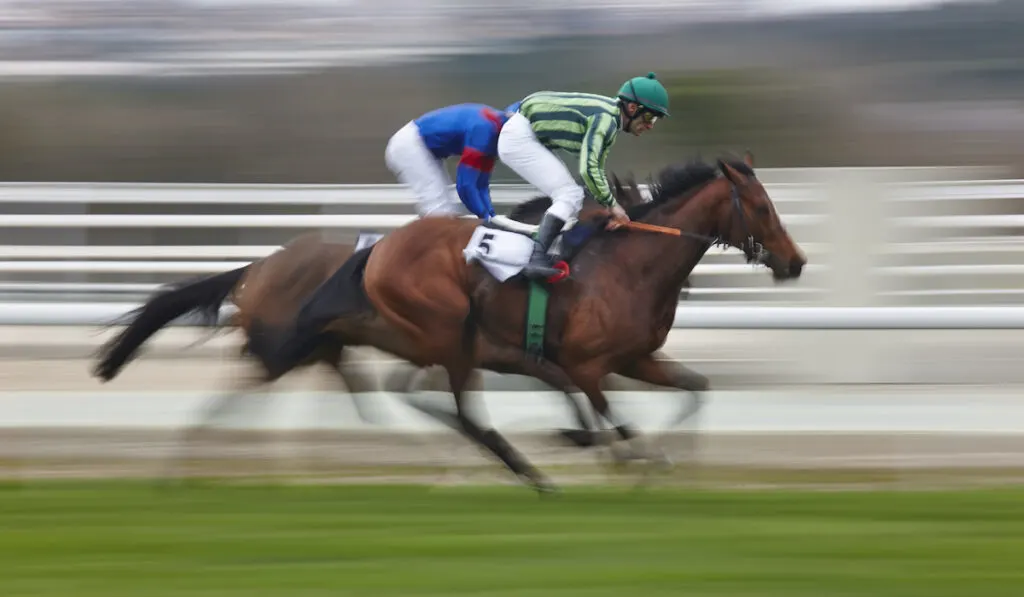
In fact, that “as long as a body is on the horse, that is what qualifies as eligible for winning” has gone to some extremes. In 1923, a steeplechase was won by a horse whose rider, Frank Hayes, suffered a heart attack mid-race and died.
Though he was pronounced dead at the scene, since technically his body remained on the horse, they were still declared the official winner of the race. (They did, however, skip the traditional post-race weighing in and unanimously decided to not contest Frank Hayes as the winner.)
There have been instances of a girth breaking and jockeys tightening their grip in the nick of time to remain mounted. Though the saddle is gone, the rider remains, meaning there is technically no grounds for a disqualification.
So can a horse win a race if it has lost its jockey? In terms of spirit, it is very much possible. Technically, a horse with heart and drive (and an uncanny instinct to run in the same direction as the herd towards the finish line) can cross the final post before the other horses.
Does that count as a win, though, in the eyes of the officials and according to the rulebook? There the answer is no. Without a jockey on board, a horse is considered disqualified, and, as impressive as his or her run may be, it is not within the legal bounds to take home a trophy.
One thing is for certain, though, and that is that those riderless racehorses tend to win the hearts of an eagerly watching public. And isn’t that what really counts?
Different Horse Races, Different Jockey Needs
As mentioned, there are more types of racing than just the flashy thoroughbred events publicized as jewels in the triple crown.
In each different type of horse racing, there are some common reasons why jockeys are important. The biggest reason of all is that they keep the horse on the correct path which lessens the threat of two horses running into each other and causing an accident. But let’s take a closer look at the role of jockeys in each racing type.
Flat Racing
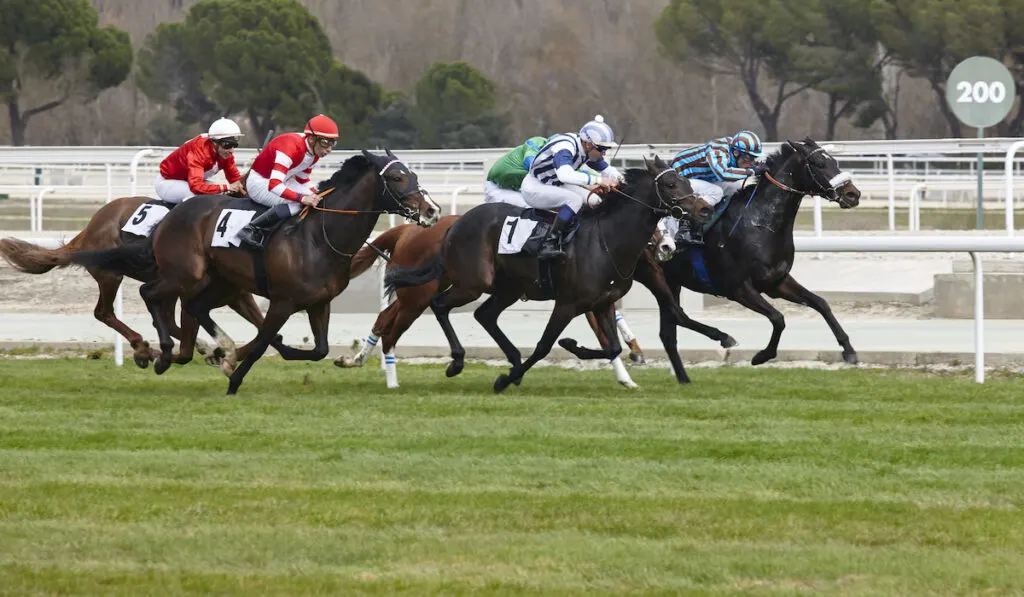
Flat racing is arguably the most recognizable form of racing. It is run, as the name suggests, over flat and level ground.
The length of the track can vary, as well as the material of the track itself (turf or dirt or synthetic), but the end goal is always the same: the first horse to cross the finish line the fastest is the winner.
Here, jockeys are employed less so for steering and strategy capabilities but more so as the driving – and braking – forces of the horse. They encourage their mounts to speed up, they do their best to hold a horse back when needed, and they more or less let their charges open up to cover the most ground, all while reining in for safety when needed.
These jockeys are sought after to be aerodynamic and light, so as to not weigh a horse down, so you are probably used to seeing them be short of stature on the ground.
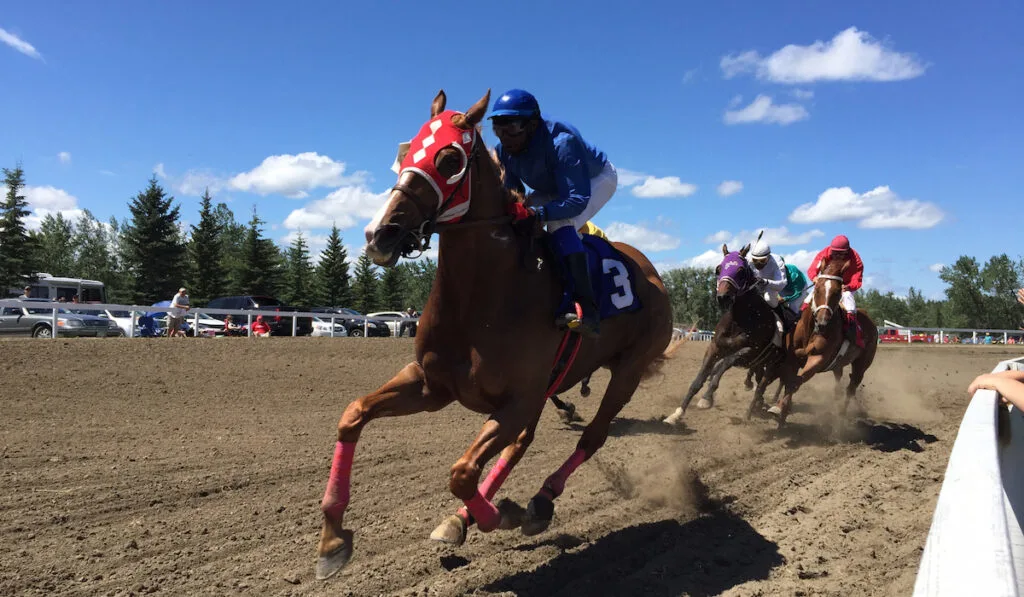
Steeplechase
Another popular – though less well-known – form of racing is the steeplechase. This builds upon the basic concept of a distance race and adds obstacles for horse and rider to jump over, all while still aiming for a winning speed.
Steeplechase jockeys need to be experienced not just in riding on flat ground but also in jumping and cross country. A competent rider is needed to control the horse in this instance – to ensure they fly over the jump rather than avoid it, to count strides to jump safely, and to keep up the momentum of speed.
Jockeys in steeplechase do carry a weight restriction as well, but there is no height restriction.
Harness Racing
Harness racing, then, is a third form – one that involves a bit more than a single horse and rider.
In harness racing, horses are hooked to light, two-wheeled carts (called a sulky) and are raced at a specific gait. The jockey in this case is seated in the sulky and controls the horse behind rather than on top.
Having a jockey in this discipline is of utmost importance. A horse hooked up to a carriage without a person in control of the situation would be a disaster.
Picture it: frightened, panicked horses spooking and most likely injuring themselves plus breaking the sulky, let alone not being focused to finish a course. The jockey helps to keep things under control and also makes sure that his own sulky doesn’t collide with any others in the race.
While there are some height and weight maximums, the restrictions are way less intense than in flat racing or steeplechase racing. This makes sense, too, as the rider is not directly joined with the horse and the physics of leverage decreases the effects of a somewhat heavier jockey being pulled along behind.
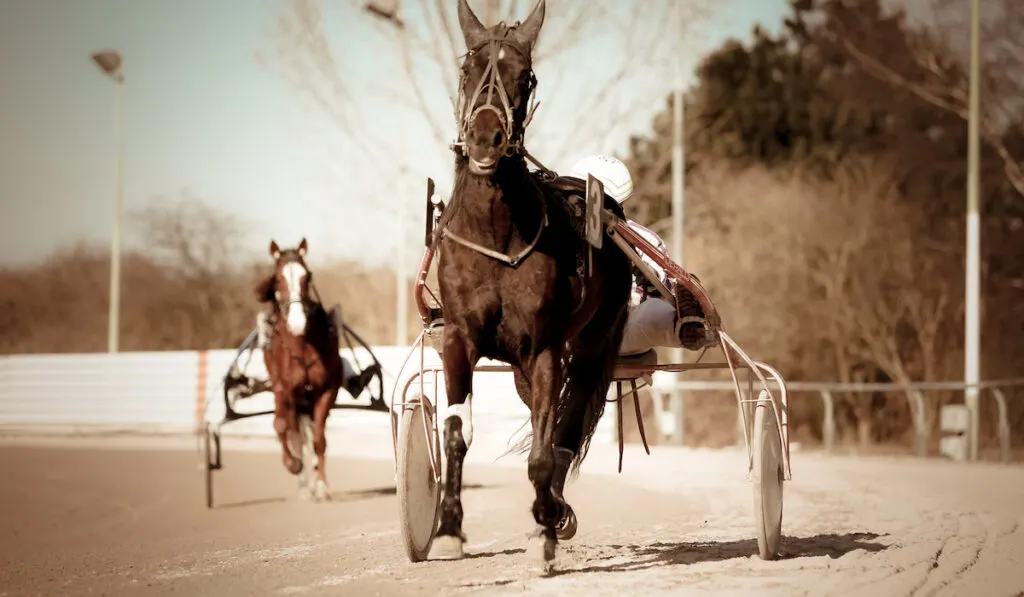
Why Jockey Weight Even Matters in Horse Racing
When it comes down to keeping a playing field as even and fair as possible, jockey weight is of utmost importance as it comes down to simple physics and math.
All horses are essentially ‘weighted’ – i.e. they are assigned to carry a designated amount of weight so that each animal is carrying the same total.
Plainly put, in this instance, a horse without a jockey would be carrying around 120 pounds less than a horse with a jockey. That would mean they are lighter, more aerodynamic, and able to run faster.
Similarly, a horse that is burdened with a jockey that is too heavy will be at an instant disadvantage due to the extra bulk. The horse would have to work just that much harder and run a bit slower than if it is carrying a load equal to its pony opponents.
Fair play and equal chance to win are why strict weight rules are enforced in horse racing.
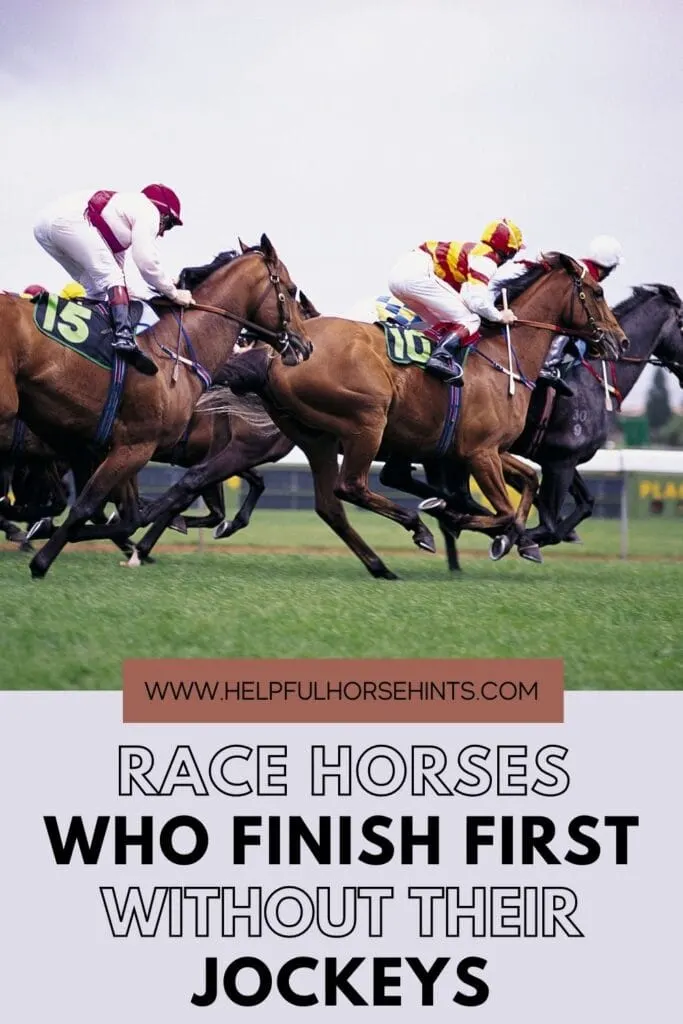
RELATED POSTS
- Best 7 Horse Breeds For Dressage
- Considering Speed: Wolf, Lion, Bear or Car – Which Can A Horse Outrun?
Source:
- https://www.nationalsteeplechase.com/glossary/


